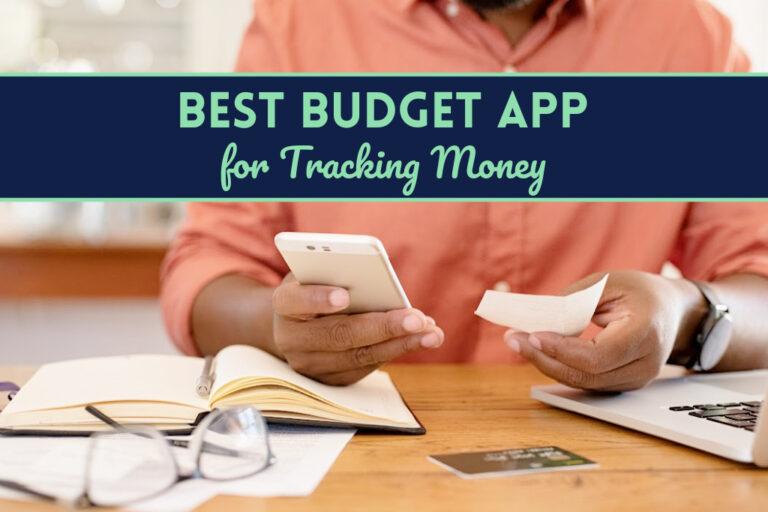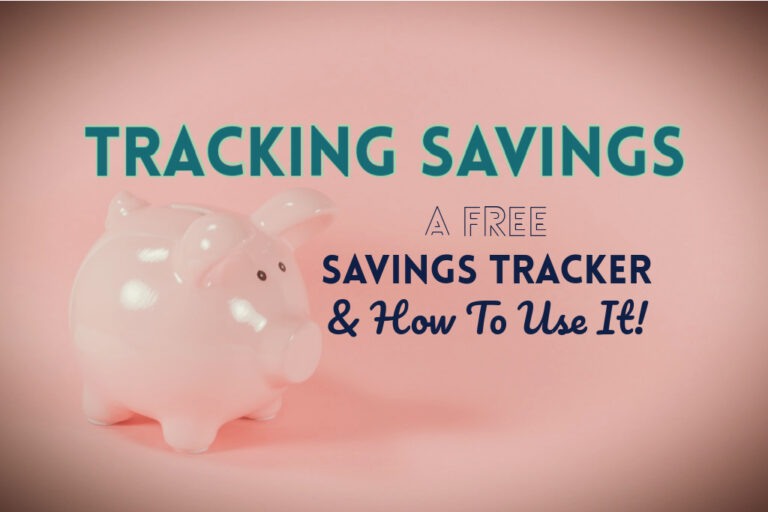Some of the links on this site are Affiliate Links and if you use them to make a purchase, we may earn a commission. For more information, read our Disclosure Policy.
Saving money is a fantastic goal – however, it is one that is easier said than done! The mere fact that you want to start saving is one step in the right direction…but reaching your goal won’t be a walk in the park. My tips on how to save money will help propel you to the finish line.
How I Saved Money
So, you have decided to save your money…but you don’t exactly know where to start. I understand; I’ve been in your shoes.
When I set a big financial goal for myself, I had to start saving money – and I had to be serious about it.
Pledging to save my money was not the first financial resolution that I had made for myself, so I knew it wasn’t going to be easy.
The thing was, I didn’t just want to save a little here and little there, I wanted to save big. In doing so, I learned how to save money on everything.
That said, it didn’t happen overnight. I steadily and deliberately implemented the tips for how to save money. In the end, not only did I reach my goal, I exceeded it.

12 Tips on How To Save Money
My How To Save Money tips are the actual steps I took to help me save money. If you are determined and employ these tips, it is how you can save money, too!
#1 Track Your Expenditures
You want to know how to save money fast? Start tracking your spending! This is one of the Save Money Strategies that is often glossed over – but it shouldn’t be because it is seriously one of the best tips on saving money.
Learn to Save Money by Tracking Expenses and Create Your Budget
In order to identify where you can save, you first have to get a crystal-clear picture of where you spend.
Keep track of all the money you spend in a day – and calculate that into weekly and monthly spending totals. Look at the numbers, scrutinize the numbers.
Pinpoint the places where you spend too much money – then make changes on what you spend your money on.
It takes some effort to alter your spending habits, but it truly pays off…in the form of big savings.
From my personal experience, tracking expenditures is how to save up money fast.
How To Budget and Save Money
Creating a budget is another method of how to save money quickly. Your budget is like a map that will help you to get where you want to be.
Within your budget, you set goals, differentiate between Wants and Needs and specifically direct part of your income to savings.
It can feel overwhelming to learn how to start budgeting and saving money – so I have a few pointers.
First, download a Free Budget Printable – it’s a basic budget worksheet that will help you get started.
For the step-by-step process of building your budget, use my advice for How To Create a Monthly Budget.
Once you’ve established your monthly spending on paper, consider using a Budgeting App to add some (or a lot!) of automation into your frugal routine.
Finally, because learning how to get better at saving money is your goal, I also recommend learning about Sinking Funds. Once you understand the concept, add one or more Sinking Funds Categories to your budget worksheet.
#2 Get Out of Debt and Establish an Emergency Fund
I’m going to be frank here: Carrying debt is a major hinderance to your savings goal. Lugging around the cost of yesterday’s purchases – and the weight of additional interest charges – is not going to help you save up for tomorrow.
I strongly recommend making it a goal to become debt-free – and then establishing a comfortable Emergency Fund.
Why Eliminating Debt is How To Start Saving Money
Everyday that you let debt sit on a credit card or in a loan, you are paying a premium. As in, you are paying extra cash for the things you already bought.
Let me put it into a real number example. In this scenario, you have worked out your budget to save $100 per month.
Example of Paying Off Debt and Saving Money at the Same Time
While you save your monthly $100, you also have $1000 on a credit card with an interest rate of 15%. You currently pay $50 a month and make no new charges on the card.
At that rate, it will take you 24 months to pay it off and you will pay $157 in interest ($1157 in total). During that time, you still save $100 monthly for a total of $2400.
Example of How To Get Out of Debt and Save Money
Now, let’s run the numbers a different way. Instead of paying off debt and saving money at the same time, get your debt paid off before you start saving.
How you do this is you add the $100 that you were going to save to your $50 payment, making your monthly payment $150 toward your $1000 credit card debt.
In just 7 months you will have the credit card completely paid off – and you will have incurred $50 in interest (for a total repayment of $1050).
Once you have eliminated your debt, you can now put the $150 you were spending on credit card repayment toward savings each month.
Just 16 months later – and only 23 months in total since you began eliminating your credit card bill – you will have saved $2400.
How an Emergency Fund Saves You Money
Now that we have covered how to save money and pay off debt, we also need to talk about the importance of establishing an Emergency Fund.
An Emergency Fund is a money savings plan that acts as a comforting cushion when things get rough financially.
It’s your go-to fund if you experience the unfortunate situation of losing a job or enduring an illness or injury that prevents you from making an income.
So, exactly how do you save money by establishing an Emergency Fund? In simple terms, you won’t rack up debt.
If you lose your income, you can use your saved cash to pay for your necessary expenses. You don’t need to take out a loan or rely on credit cards.
Only you can determine how much your emergency fund should be. It is generally recommended to start with $1000. Eventually build it up to an amount that would cover 3-6 months of your necessities.
#3 Cut Down Your Living Expenses
One of the best ways to save money is to cut down or negotiate some of your expenses.
We often pay our bills as part of our routine – or even completely automate the process, eliminating the need to think about it at all.
However, you could possibly be paying too much. One of the top tips to save money fast is to negotiate your bills for your living expenses.
Saving Money Tips for Negotiating Expenses
Negotiating the cost of your living expenses is one of the clever ways to save money…and it’s so simple!
Find out if there is a better deal for your cable package, contact the water company to see if you qualify for additional savings.
See if there is a money-saving benefit to using electricity at off-peak hours or find out if you can lower your car insurance payment.
Additionally, you can contact your bank to see if there are special savings opportunities for switching to online banking or if there is a lower interest rate on your home equity loan than your credit card.
If you are unsure where to begin, review my checklist of frugal hacks and other money saving tips.
#4 Embrace Frugality
Learning how to be frugal is key if you want to really save money.
There is a big misnomer that being frugal is being cheap – and that is just not true; being frugal and being cheap are two different things.
Frugality is clearly defining your wants and your needs. It’s being particular about how you spend your money so that you can determine how best to save money.
Being frugal, at the heart of it, is saving money on things that aren’t important so that you can spend it on the things that are.
I have always had frugal tendencies – but when I was trying to reach my money goal, I tasked myself with learning how to live a frugal life.
I began to change my relationship with money. The more frugal I became, the more I learned how to save my money.
How To Save Money Each Month by Being Frugal
Being frugal is one of the top money-saving strategies because it works! If you want to learn how to save the most money, check out my list of extremely frugal tips.
Keep in mind that it does take some finesse to learn how to save money effectively with frugality. Find what works for you – and avoid frugal habits that don’t pay off!

#5 Save Your Windfalls
Saving windfalls might be the absolute best money-saving tip, simply because it is so incredibly easy!
Windfalls are extra or unexpected money that comes your way. It’s what I like to call, The Gravy. It’s the money on top of your income – and stashing it away is solid saving money advice.
Birthday money from mom, a Christmas bonus from the boss, your tax refund and your yearly raise are all examples of windfalls that you can save.
How To Save Up Money with Windfalls
In this simple Save Money Plan, all you need to do is save The Gravy. Whenever you have a little bonus cash come your way, commit to save the money, and not spend it.
Putting the cash into a separate banking account is the best way for how to save the extra money. It will be out of sight, out of mind and out of reach. Without it comingling with your regular income, you will be less tempted to spend it.
#6 Start Making More Money
Want an insider tip on how to save more money? Make more money!
Too many people dismiss the idea of taking on more work as one of the steps to save money, but it can be incredibly lucrative.
In addition to the benefit of having more cash to save, you will also likely be busier, meaning less time to spend money.
Ideas on How To Save Money by Making More
Earning more can be the best way to save money. Put in overtime at the office. Take on a part-time job. Start a side hustle. Turn a hobby into an income.
There are endless ways people can earn extra cash. The key is to find something that is both profitable and something you enjoy. When you hit that sweet spot, it will feel like you hit the jackpot.
Just keep your goal in mind – and remember that you took on the extra work because you were looking for ways to start saving money, not ways to spend more money…so save whatever extra you make.
#7 Stop Spending
I have to admit, this one is so obvious that I debated whether or not to include it in my tips for how to learn to save money. Yet here it is at number 7 on my list.
Sometimes when we look into how to start saving money, we don’t consider the easiest route – and one of the easiest ways to save your money is to stop spending it.
Stop walking into stores. Don’t go out to eat. Stay off of Amazon. Ditch your car and use public transport (or walk instead for some frugal exercise!).
How Can I Save Money without Spending It?
Alright, not spending money might be the obvious path to saving money, but that doesn’t mean it is easy to implement!
It takes guts, a good plan and hard-core determination to alter our spending habits. But, let’s be honest, we all know that the best way to start saving money is to not spend it.
To learn how to start to save money instead of spending it, I recommend first identifying your spending triggers.
Once you understand your downfalls, make adjustments to correct your behaviors. Use my actionable tips for How To Stop Spending.

#8 Curb Your Appetite for High-Priced Food
Food is a necessity, but it doesn’t have to be expensive. In fact, cutting back on food expenses is one of the best ways on how to save money.
If you want to learn how to spend less money on food then stop eating at restaurants, stop ordering take away and cook your own food at home.
Making your own meals is a surefire plan for how to reduce expenses and save money. At the very least, find new ways to eat out on a budget.
Honestly, getting more frugal with your food can literally save you hundreds of dollars every month.
How to Save Money on Groceries
If you are already saving and budgeting by avoiding pricey restaurant food, you might wonder how much more you can save.
It just so happens that I have a few tips on how to save on groceries – and you can find them in these articles: When (and when not to) Use a Coupon and my guide to shopping for Groceries on a Budget.
That said, if you are digging deep to find ways for how to save money on a tight budget, then I recommend taking on a big challenge, like my $5-per-Day Food Challenge.
#9 Find Free Entertainment
If you are looking for ways of how to save money on a budget, then free entertainment might be your golden ticket!
When I was learning how to be frugal and save money, there was nothing that excited me more than finding free activities. In fact, finding free things to do is still a big part of my frugal lifestyle.
How To Save Your Money on Entertainment
Partaking in cheap entertainment is sage advice for saving money…you just need to know where to look.
I recommend analyzing your favorite things to do and then seeking out free or cheap alternatives to expensive activities.
Love museums? Find out which days are free. Like to be creative? Learn how to upcycle. There are heaps of cheap hobbies – you just have to find one that fits your style and interests.
Really want to get creative with saving money? Use my tips for the 52 Best Cheap Dates.
#10 Automate Your Savings
Do you want to know how to save more money each month? Do it automatically! When money is automatically deposited from your paycheck into a separate account, you can save a lot of money fast.
The key is to keep the money separate…and periodically check in to see how much it has grown.
How To Save Money Monthly with Automatic Deposits
Setting up auto direct deposits is one of the best ways for how to save money from your salary. By saving the money before it hits your primary bank account, you are less likely to miss it.
First, you need to set up a separate account – be it a savings account or investment account. Then, you need to determine how much money you should save a month.
Use your budget to help you get to the right number. Finally, ask your HR representative for the form and inquire what else they might need and submit the information. It’s an easy-peasy, simple savings plan for how to save money from salary.
I Want To Save Money, but Direct Deposit is Not an Option
If your employer does not offer direct deposit, you can still create an easy saving plan for your salary.
Instead of auto deposits, opt to pay into your savings account like a bill and make it part of your finance routine.
Just like with auto deposits, set up a separate account and decide how much of your income you should save a month.
Then, when you write your monthly bills, make your deposit as if it is a required payment…just like your electric bill or mortgage payment. It takes discipline, but it’s a great method for how to begin saving money.
#11 Learn the Basics of Investing
Investing at a young age is the best advice on how to save money that I ever received. You don’t need to become a day trader to start investing. In fact, I recommend starting with a good ol’ 401k.
Get educated on your company’s 401k benefits. Find out if they offer a match (which is basically free money for you!) – and find a way in your budget to contribute enough to max out the benefit. Your HR rep should be a big help, but this Forbes 401k article explains the basics.
How To Save a lot of Money in Investments
Understanding how to save money for future retirement is essential. You can choose to aggressively save money or opt for a slow and steady strategy. In addition to your company 401k, you can set up IRA and brokerage accounts.
Learning how to save and invest might sound intimidating – and even a little scary – but understanding the foundation of investing will help open your mind to the possibilities.
Educate yourself by reading financial books that are easy to understand and digest. The Simple Path to Wealth is a good place to start.
#12 Get Psyched with Savings Games
On your mission of how to learn to save, you need to keep your momentum up and your mind in a positive space. In other words, you need to learn how to make saving money fun!
There are tons of ways to create excitement about your savings goals.
Instituting Fun Savings Games is one of the best tips on how to save money fast. You make up the rules and then watch your savings grow.
Another method to save money is by Tracking Savings. With a savings tracker, you can visually see your progress – which helps to keep you motivated to reach your goal.
Repeating positive affirmations about saving money is a way to save money while keeping your head in the game. Use my top tips for Money Affirmations to get started.
Another way to make the process more enjoyable is to remember to reward yourself. Your rewards don’t have to be expensive – in fact, they shouldn’t be costly at all! Cheap rewards can provide just the motivation you need to successfully reach your goal!

How To Learn How to Save Money
My tips will help you learn how to save money – but I want to share some general advice about finances to help ensure you reach your money saving goals!
Get Organized
Before you can even start to consider how to save money every month, you need to get your finances organized!
The first step is to review your Money Numbers. The key financial figures will give you an overview of your money situation.
Next, create a tidy space for your financials and get a system in place. This will allow you to stay on top of your money as you learn how to save (and pay off debt, if need be!).
If you are a family that is aiming to save money, make sure everyone participates in the family finances.
Create a Money Saving Plan
A Saving Money plan is essential for you to reach your goal! Take some time to think it through and write it down.
Your plan to save money doesn’t need to be a manifesto, but it should be thought out with a clear objective and specific steps you will take to achieve your goal.
While on your money saving journey, review your personal savings plan and make adjustments as needed. In doing so, you will teach yourself how to save money better.
Saving Methods
One of the keys to saving money is to determine not only how you will save money, but where you will save money.
I have already mentioned opening a separate bank account – which is what has worked well for me. I like high-yield savings accounts (although they don’t pay what they used to) the rates are better than than a standard account.
However, depending on your goal, you might want to open an investment account (for long-term savings) or save your money at home in a money jar (for short-term saving goals).
Make a Commitment to Yourself
The most important thing that you can do to ensure you reach your savings goal is to make a commitment. Make a pledge that you will succeed. Tell supportive family or friends so they will help encourage you along the way. Toss aside any negative stigmas people might try to lob at you. Believe that you can meet your goal – I do!
Interested in more of my Budget and Goal Tips? I round them all up on the Budget & Goals page!








